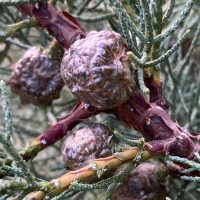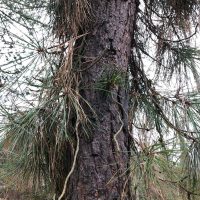February 2023 Plant Profile: Baker Cypress

The Baker cypress, the most northern and hardiest cypress in North America is a tree with a challenging future ahead of it. Within its native range of southern Oregon and northern California there are several populations, many a long distance separate from others.
Read moreJanuary 2023 Plant Profile: Pitch Pine

What better time than winter to highlight one of the Arboretum’s conifer specimens? January is also an excellent time to take a trip out to Foster Island to walk amongst some of the many birds that make the Arboretum home. Beside the path on Foster Island – just before you cross under the 520 bridge – you will find a pair of Pinus rigida. The species name rigida refers to its stiff and sharp cone scales and needles. The tree’s common name – pitch pine – derives from the high resin content in its wood.
Read moreDecember Plant Profile: Bronze Loquat

We added an interesting specimen this year as a foundation tree in the newly renovated Soest Herbaceous Display Garden bed 3. Our Bronze Loquat was grown from seed that was wild collected by Dan Hinckley at higher elevation in the mountains of Taiwan. We received a sapling from Dan in 2014 and have grown it to larger size in our nursery before planting earlier this year.
Read more“Sugar We’re Going Down” – The Sugar Maple Plant Highlight

When Fall Out Boy sang,
“We’re going down, down in an earlier round
And sugar, we’re going down swinging,”
they were actually referring to leaves falling in autumn and the wonderful process of tapping sugar maple trees for syrup (not really, but wouldn’t it be funny).
Read moreOctober 2022 Plant Profile: Crape Myrtle

I’ve been touting crape myrtle as Seattle’s “tree of the future” for years now. And, because of climate change, I daresay, the future is now! Lagerstroemia indica is a beautiful tree for all seasons; outstanding in flower, fall color and winter bark interest.
Read morePlant Profile Chamber’s Paintbrush

If you have the fortune to be botanizing in southwest Washington, you might have the chance to encounter one of Washington’s rare paintbrush species. At first glance you might think this is the common, harsh paintbrush (Castilleja hispida) since both species have the same vibrant, orange-colored bracts and both are found at low to mid elevations. But it is in fact Chamber’s paintbrush (Castilleja chambersii), and when you look more closely at the leaves, you will see what is so unusual about this species.
Read moreAugust 2022 Plant Profile: Nolina nelsonii

After 29 years, our incredible, show-stopping Nolina nelsonii specimen is flowering at the Center for Urban Horticulture!
Read moreJune 2022 Plant Profile: Enkianthus campanulatus

Imagine you walk deep into a woodland in Japan, the Hokkaido region, and along a rocky creek side you see these small clouds of nodding bell-shaped flowers. Hues of pink, maybe yellow, some with striations of red (hence it’s English common name, red-veined enkianthus).
Read moreRare Plant Profile: Basalt Daisy

Basalt daisy (Erigeron basalticus) is a cliff dweller, found exclusively along the Yakima River Canyon and Selah Creek. There you will find it tucked into crevices and cracks of the basalt cliffs formed in the late Miocene (5 to 11 million years ago). There are six known populations in Washington State. Over the past few years Rare Care has made a concerted effort to re-monitor all known occurrences, and we only have one left to visit!
Read moreApril 2022 Plant Profile: Field Horsetail: Weed or Wonder?

Horsetail, a plant that Seattle area gardeners love to hate. Have it in your garden? You have likely been fighting it for years. But this plant is more than just a weed. Field horsetail, Equisetum arvense, is a tenacious perennial native to the temperate and arctic regions across the northern hemisphere, including the Pacific Northwest.
In early spring I often encounter visitors wondering about the otherworldly-looking reproductive stems of field horsetail.